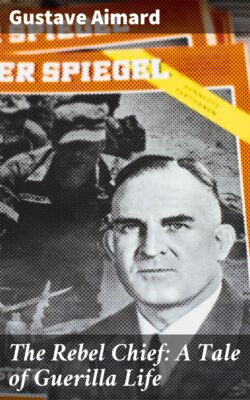Читать книгу The Rebel Chief: A Tale of Guerilla Life - Gustave Aimard - Страница 7
CHAPTER IV. EL RAYO.
ОглавлениеAt the period when our story takes place, one man in Mexico had the privilege of concentrating on himself the curiosity, fears, and, more than all, the sympathy of all.
This man was El Rayo, that is to say, the Thunder.
Who was El Rayo? Whence did he come? What did he do?
These three questions, short though they were, no one could have answered with certainty.
And yet a most extraordinary number of legends was current about him.
We will tell in a few words the facts known about him.
Toward the close of 1857 he had suddenly appeared on the road that runs from Mexico to Veracruz, the police control of which he undertook in his fashion, stopping convoys and mail coaches, protecting or levying blackmail on the passengers, that is to say, in the second event, obliging the rich to bleed their purses slightly in favour of their companions less favoured than themselves by fortune, and forcing the leaders of escorts to defend the persons they were ordered to accompany against the attacks of the salteadores.
No one could have said whether he was young or old, handsome or ugly, brown or fair, for his face had never been seen uncovered. As for his nationality, it is equally impossible to determine, for he spoke with the same facility and elegance Castilian, English, French, German and Italian.
This mysterious personage was perfectly well informed about everything that occurred in the territory of the republic; he knew not only the name and social position of the travellers with whom he thought proper to have dealings, but was also acquainted with certain peculiar facts about them which often rendered them very ill at ease.
A stranger thing than any we have yet mentioned was, that El Rayo was always alone, and never hesitated to bar the way of his adversaries, no matter what their number might be. We must add that the influence which his presence exercised over the latter was so great, that the mere sight of him sufficed to check any wish of resistance, and that a threat from him made a shudder of terror course through the veins of those whom he addressed.
The two presidents of the republic, while carrying on a deadly war to supplant each other, had each separately tried on several occasions to deliver the highway from so troublesome a caballero, who seemed to them a dangerous rival; but all their attempts to obtain this result had failed in a deplorable manner. El Rayo, being put on his guard, no one knew how, and perfectly informed as to the movements of the soldiers sent in search of him, always appeared suddenly before them, foiled their tricks, and compelled them to make a disgraceful retreat.
On one occasion, however, the government of Juárez hoped that it was all over with El Rayo, and that he could not escape the measures taken to seize him.
It was learned that for some nights past he had been sleeping at a rancho situated a short distance from Paso-del-Macho; a detachment of twenty dragoons, commanded by Carvajal, one of the most cruel and determined guerilleros, was immediately, and with the utmost secrecy, sent to Paso-del-Macho.
The commandant had orders to shoot his prisoner so soon as he seized him, doubtless to prevent him from making any attempt to escape while being conveyed from Paso-del-Macho to Veracruz.
The detachment, therefore, set out in all haste; the dragoons, to whom a large reward was promised if they succeeded in their awkward expedition, were perfectly prepared to do their duty, as they felt ashamed of having been so long held in check by one man, and were burning to take their revenge at last.
The soldiers arrived in sight of the rancho; when about two leagues from El Paso they had met a monk, who, with his hood drawn over his face, and mounted on a sorry mule, was trotting on, and telling his beads.
The commandant invited the monk to join his squadron, which offer the monk accepted with some degree of hesitation. At the moment when the detachment, which was marching in rather loose order, reached the rancho, the monk dismounted.
"What are you doing, padre?" the commandant asked him.
"As you see, my son, I am getting off my mule; business calls me to a rancho a short distance off, and while leaving you to continue your journey, I ask your permission to leave you, while thanking you for the pleasant company you have afforded me since our meeting."
"Oh, oh!" the commandant said, with a coarse laugh, "That will not do, señor padre; we cannot separate in that manner."
"Why so, my son?" the monk asked, approaching the officer, though still holding his mule.
"For a very simple reason, my worthy Fray—"
"Pancracio, at your service, señor caballero," the monk said, with a bow.
"Pancracio—very good," the officer continued. "I want you, or, to speak more correctly, your good offices: in a word, I want you to shrive a man, who is about to die."
